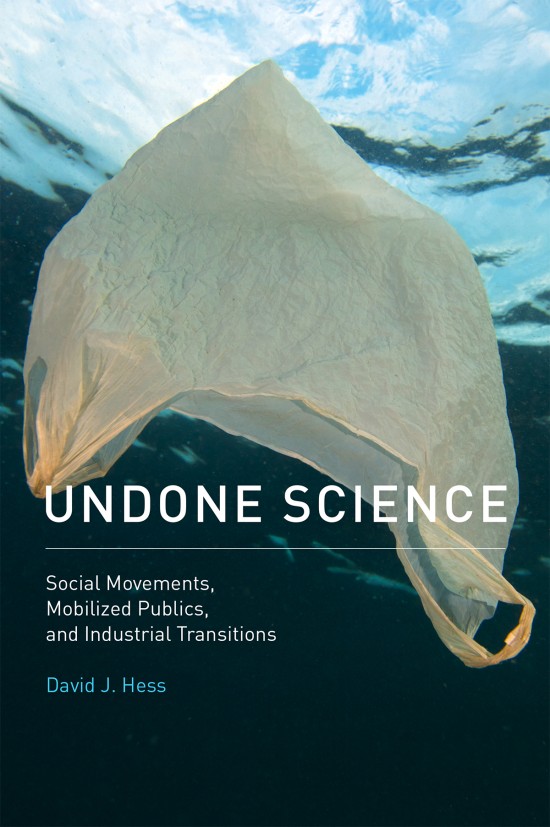Science as Social Struggle
Review of David J. Hess, Undone Science: Social Movements, Mobilized Publics, and Industrial Transitions
By Syed Raza
Volume 22, number 1, The Return of Radical Science
“Perseus wore a magic cap so that the monsters he hunted down might not see him. We draw the magic cap down over our own eyes and ears so as to deny that there are any monsters.”1— Karl Marx
There is a nether side to published scientific work—the results not reported, the research left undone, the funding not received, the questions not asked—the luminous summits that are still uncharted. These unexplored epistemic regions are signified as undone science: the negative shadow cast by structural repression and patterns of ignorance. How can we fight social monsters when the magic cap of science is used to deny their very existence? Less poetically, how can we overcome the systematic production of ignorance and institutional barriers to collective action? David Hess’s book Undone Science: Social Movements, Mobilized Publics, and Industrial Transitions attempts to tackle such pressing—perhaps even existential—questions.
As Hess explains, “undone science is not only about absent knowledge; it is also about a structured absence that emerges from relations of inequality that are reflected in the priorities for what kinds of research should be funded. It is about the contours of what funders target as important and unimportant areas of research” (33). This definition immediately moves us from the metaphysical and conceptual domains of the philosophy of science to the economic, social, political, and cultural dimensions of science as a contentious human endeavor. Specifically, Hess uses generative frameworks and concepts from the fields of social movement studies (SMS) and science and technology studies (STS) to understand the interactive co-constitution of science and society.
Hess proceeds methodically, beginning each chapter with a section on SMS, followed by a section on STS, and concluding with a section on that harmonizes both frameworks. Although his syntheses can be applied to many kinds of scientific enterprise, he focuses on industrial transitions spurred by public mobilizations that transform scientific-political regimes. He presents a fourfold typology:
- alternative industrial movements (alternative technologies, from public transit to smart growth)
- industrial opposition movements (risks, uncertainties, and hazards—from regulating nuclear waste to ensuring rights to privacy)
- industrial restructuring movements (accountable and democratic organizational forms, from credit unions to community media)
- industrial access movements (inequalities of access and remedies, from affordable housing to investment in under-researched diseases)
While this is primarily a theoretical book, the theory is substantiated by a multitude of empirical case studies. Three of these are particularly expressive: First, the example of Iceland Foods, which took advantage of social pressures to market alternatives to genetically modified “Frankenfoods.” This shows how competitive fragmentation in the industrial field can work in favor of consumer-based social movements. A second example involves efforts to “de-scientize” decision-making by considering the social impacts of a scientific policy, such as attempts to ban transgenic maize in Mexico because of its negative impact on agricultural communities. Such grassroots resistance influenced an expert advisory group’s proposal for “including cultural, political, and other concerns of rural communities in the policy-making process.” This illustrates the course of “epistemic boomerang,” where local concerns are thrown into the communicative space and amplified by international actors with institutional visibility; such concerns then return to the local region infused with greater prestige and expert authority (63-64).
Finally, there is a case of citizen science, the “Louisiana Bucket Brigade” that developed new ways to crowdsource mapping after the 2010 Deepwater Horizon oil spill. Citizen efforts created a public database when the official government investigation was seen as failing to address local concerns, given its restrictive methodology and limited set of research questions. Many other rich examples range from diverse institutional responses to colony collapse disorder in beehives to the workings of public interest science organizations such as Science for the People.
While Hess makes creative contributions, there is an unacknowledged elephant in the room whose gravitational field affects all the factors that Hess has so skillfully analyzed. That is, the structural constraints imposed by capitalism: market dependency, separation of the economy from society as an autonomous and independent field, structural antagonism between capital and labor, technocratic drive, ecological and metabolic rift, and marginalization of all unprofitable aspects of existence. Although Hess does speak about capitalist imperatives and social inequalities in struggles over science, these are seen more as background conditions, with the existing order being taken for granted. He presents no theory of capitalism or of social emancipation, nor any serious counterfactual exploration of what science could be like in a truly just, socialist society.
Unfortunately, this lack of emancipatory vision is only to be expected in light of the waning of anti-capitalist frameworks from SMS and STS literature, a malaise symptomatic of larger neoliberal trends in academia.2 Lacking a critical framework for historically analyzing social systems and their transition from one form to another, Hess is ill-equipped to tackle the question of social transformation. This is particularly problematic in light of Hess’s preference for field-theory approaches such as Pierre Bourdieu’s, which have been the subject of extensive arguments and evaluation in both Marxism and sociology. This predicament is further exacerbated by the encroachment of market imperatives in the academic sphere, resulting in an incentive structure that rewards distortions of radical theories.3 While Hess’s book merits attentive engagement, ultimately what Dylan Riley said of Bourdieu also rings true of Hess’s sociology: “Perhaps it is the placeholder for whatever truly radical critical theory will come after. In any case, a radical, self-conscious movement to subject the entire [sic] of society to truly human control will signal not the fulfillment but the end of Bourdieusian sociology.”4
David J. Hess, Undone Science: Social Movements, Mobilized Publics, and Industrial Transitions
The MIT Press Sep 30, 2016
258 pages
ISBN 9780262529495 (paperback)
ISBN 9780262035132
About the Author
Syed Raza is the Research Analyst and Project Manager at the New York City Department of Health and Mental Hygiene, where he focuses on developmental delays, congenital disorders, and disabilities among children, particularly autism. He completed his Master of Public Health degree from Columbia University and will start his doctoral studies in sociology at the University of Texas at Austin this coming fall. He has previously researched the unyielding opioid epidemic during his graduate studies, and the enduring environmental and occupational health struggles in central Appalachia during his undergraduate studies at the University of Kentucky.
References
- Karl Marx, Ernest Mandel, and Ben Fowkes, Capital: A Critique of Political Economy, Volume One (London: Penguin Classics; 1990), 91.
- On SMS, see Gabriel Hetland and Jeff Goodwin, “The Strange Disappearance of Capitalism from Social Movement Studies,” in Marxism and Social Movements, ed. Colin Barker, Laurence Cox, John Krinsky and Alf Gunvald Nilsen (London: Historical Materialism Book Series, 2013), 83-102. On STS, see Langdon Winner. “Upon Opening the Black Box and Finding It Empty: Social Constructivism and the Philosophy of Technology.” Science, Technology, & Human Values 18, no. 3 (1993): 362-78. On larger neoliberal trends, see Charles Thorpe, “Radical Intellectuals, History, and the Soviet Union,” Journal of Historical Sociology 30 (April 2017): 86—91.
- See Michael J. Thompson and Gregory Smulewicz-Zucker. Radical Intellectuals and the Subversion of Progressive Politics: The Betrayal of Politics (Basingstoke: Palgrave Macmillan, 2015).
- Dylan John Riley, “Bourdieu’s Class Theory: The Academic as Revolutionary,” Catalyst: A Journal of Theory and Strategy Volume 1, Issue 2 (Summer 2017): 136. Also refer to redemptive responses by Burawoy, Heilbron, and Steinmetz and Riley’s rebuttal in Catalyst Volume 2, Issue 1 (Spring, 2018).






